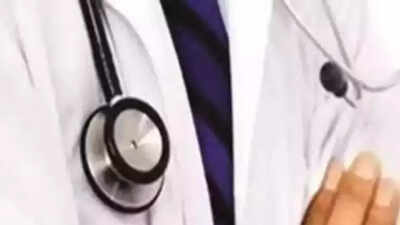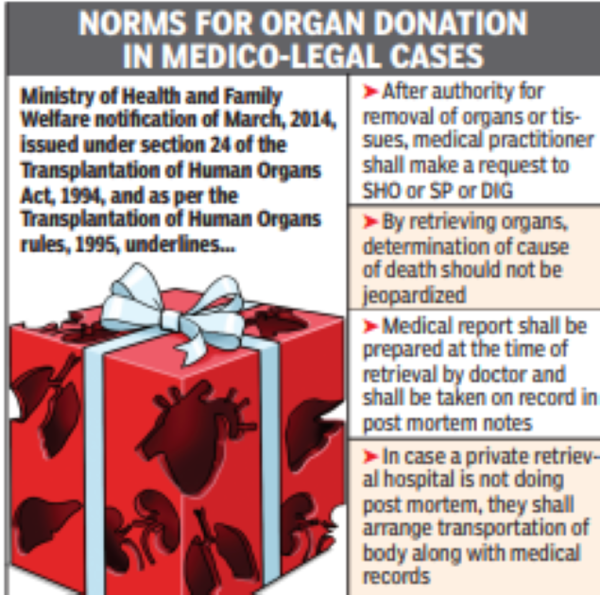Top Searches
- News
- City News
- nagpur News
- Cops, doctors in legal tangle as family of Betul murder victim donates organs, eyes
Cops, doctors in legal tangle as family of Betul murder victim donates organs, eyes

Representative image
NAGPUR: Decision of a family from Betul in Madhya Pradesh to donate organs of their murdered kin, which saved three lives and added corneas to the eye banks, has triggered a debate on laws and norms regarding organ donation in medico-legal case.
According to press released issued by Betul police, a 68-year-old man, Dinesh Agrawal, was struck on the head and neck with a hammer and iron rods on February 27. He was shifted to a private hospital here on February 28 and declared 'brain dead' on Friday (2.43 pm) and dead in the wee hours of Saturday.
Doctors who were involved in the organ donation process said they were "confident" that the cause of death was "head injury" and "brain haemorrhage" and post mortem would be a mere formality.

However, sources said more than 30-35 serious injuries were found all over the body, including chest, hands and legs when the autopsy was performed at the Mayo Hospital on Saturday late evening.
Since the liver and kidneys had been donated, it is learnt, only a part of the viscera could be sent for chemical analysis to the Regional Forensic Science Laboratory.
"Stomach is known as the 'magic box' in forensic as from outside one can't tell what injuries can be found inside. Most of the viscera had already been donated before the autopsy. As only part of the viscera was sent for chemical analysis, finding whether anything was fed to or consumed by the deceased remains a mystery," said an expert on the condition of anonymity.
A team of doctors retrieved the liver, two kidneys and a pair of cornea from the body on the basis of the consent given by the family members, a questionable no-objection certificate issued by the Betul police and intimation letter to the nearest Lakadganj police.
None from the Lakadganj police station had gone to the hospital for inquest panchnama before the organs were retrieved and allotted to three patients on the wait list, including two at the same hospital.
CP Amitesh Kumar said Lakadganj police station had not received any written communication from Betul police about the NOC and now a case of accidental death is being registered.
"The inquest was performed before the post mortem," he said adding that police are not part of any foul play or nexus. Though the CP said he had ordered to stop the organ donation after learning about the case, a communication from the Zonal Transplant Coordination Committee (ZTCC) stated otherwise.
Dr Anand Sancheti, director of New Era Hospital where the organ donation and transplantation took place, said he had completed all formalities as per law. "As per my knowledge and suggestions from forensic experts, the autopsy was just a formality. We had taken permission from Betul police for organ retrieval and transplantation as per the wish of the family," he said.
Betul SP Simala Prasad confirmed issuing NOC for organ donation of the murder victim. Experts on the subject stated the Transplantation of Human Organs and Tissue Act does not have any clause empowering police to allow organ donation and transplantation in medico-legal cases.
While a key doctor in the process stated that there was no need to inform the local police, clauses mentioned in the Act and notification issued in March 2014 by the Ministry of Health and Family Welfare in exercise of the powers conferred by section 24 of the Transplantation of Human Organs Act, 1994, and rules 1995 underlined that local station house officer, superintendent of police and inspector general of police 'facilitate timely retrieval of organs or tissue from the donor'.
Sources in Mayo Hospital stated there was no intimation about the medico-legal organ donation and conducting autopsy on the body of the murdered person whose organs were donated.
Dr Sancheti said he had sent the detailed documents with the body to Mayo.
According to forensic experts, hospitals should inform forensic experts during organ donation and transplantation in medico-legal case, especially if it is a serious one as a murder. "In fact, it's an issue of destruction of evidence as the consent and permission for conducting the organ donation and transplantation did not come from any competent authority notified by the state or the central governments," they said.
Dr Sanjay Kolte, president of ZTCC, said state authorities issue permissions to hospital for conducting transplants and have committees to verify brain dead report. "In the murder case, proper norms were followed under ZTCC supervision. We verified the reports declaring the person brain dead, investigation and all other records before checking the wait list of patients and allotting the organs as per the order," said Kolte.
Full report on www.toi.in
According to press released issued by Betul police, a 68-year-old man, Dinesh Agrawal, was struck on the head and neck with a hammer and iron rods on February 27. He was shifted to a private hospital here on February 28 and declared 'brain dead' on Friday (2.43 pm) and dead in the wee hours of Saturday.
Doctors who were involved in the organ donation process said they were "confident" that the cause of death was "head injury" and "brain haemorrhage" and post mortem would be a mere formality.

However, sources said more than 30-35 serious injuries were found all over the body, including chest, hands and legs when the autopsy was performed at the Mayo Hospital on Saturday late evening.
Since the liver and kidneys had been donated, it is learnt, only a part of the viscera could be sent for chemical analysis to the Regional Forensic Science Laboratory.
"Stomach is known as the 'magic box' in forensic as from outside one can't tell what injuries can be found inside. Most of the viscera had already been donated before the autopsy. As only part of the viscera was sent for chemical analysis, finding whether anything was fed to or consumed by the deceased remains a mystery," said an expert on the condition of anonymity.
A team of doctors retrieved the liver, two kidneys and a pair of cornea from the body on the basis of the consent given by the family members, a questionable no-objection certificate issued by the Betul police and intimation letter to the nearest Lakadganj police.
None from the Lakadganj police station had gone to the hospital for inquest panchnama before the organs were retrieved and allotted to three patients on the wait list, including two at the same hospital.
CP Amitesh Kumar said Lakadganj police station had not received any written communication from Betul police about the NOC and now a case of accidental death is being registered.
"The inquest was performed before the post mortem," he said adding that police are not part of any foul play or nexus. Though the CP said he had ordered to stop the organ donation after learning about the case, a communication from the Zonal Transplant Coordination Committee (ZTCC) stated otherwise.
Dr Anand Sancheti, director of New Era Hospital where the organ donation and transplantation took place, said he had completed all formalities as per law. "As per my knowledge and suggestions from forensic experts, the autopsy was just a formality. We had taken permission from Betul police for organ retrieval and transplantation as per the wish of the family," he said.
Betul SP Simala Prasad confirmed issuing NOC for organ donation of the murder victim. Experts on the subject stated the Transplantation of Human Organs and Tissue Act does not have any clause empowering police to allow organ donation and transplantation in medico-legal cases.
While a key doctor in the process stated that there was no need to inform the local police, clauses mentioned in the Act and notification issued in March 2014 by the Ministry of Health and Family Welfare in exercise of the powers conferred by section 24 of the Transplantation of Human Organs Act, 1994, and rules 1995 underlined that local station house officer, superintendent of police and inspector general of police 'facilitate timely retrieval of organs or tissue from the donor'.
Sources in Mayo Hospital stated there was no intimation about the medico-legal organ donation and conducting autopsy on the body of the murdered person whose organs were donated.
Dr Sancheti said he had sent the detailed documents with the body to Mayo.
According to forensic experts, hospitals should inform forensic experts during organ donation and transplantation in medico-legal case, especially if it is a serious one as a murder. "In fact, it's an issue of destruction of evidence as the consent and permission for conducting the organ donation and transplantation did not come from any competent authority notified by the state or the central governments," they said.
Dr Sanjay Kolte, president of ZTCC, said state authorities issue permissions to hospital for conducting transplants and have committees to verify brain dead report. "In the murder case, proper norms were followed under ZTCC supervision. We verified the reports declaring the person brain dead, investigation and all other records before checking the wait list of patients and allotting the organs as per the order," said Kolte.
Full report on www.toi.in
Start a Conversation
FOLLOW US ON SOCIAL MEDIA
FacebookTwitterInstagramKOO APPYOUTUBE









